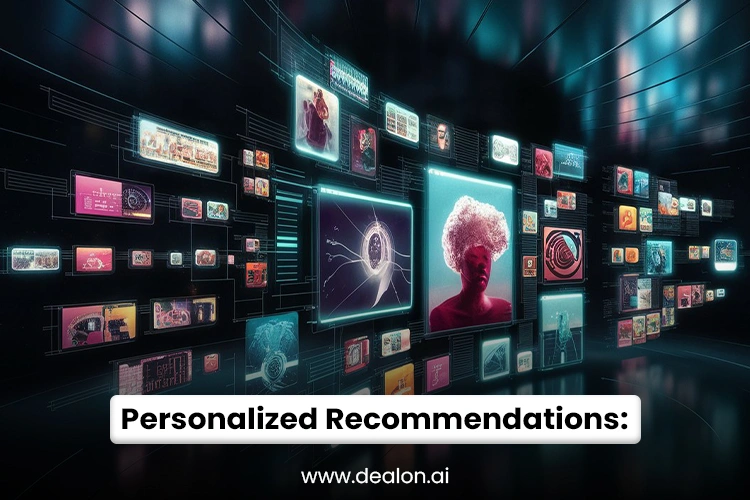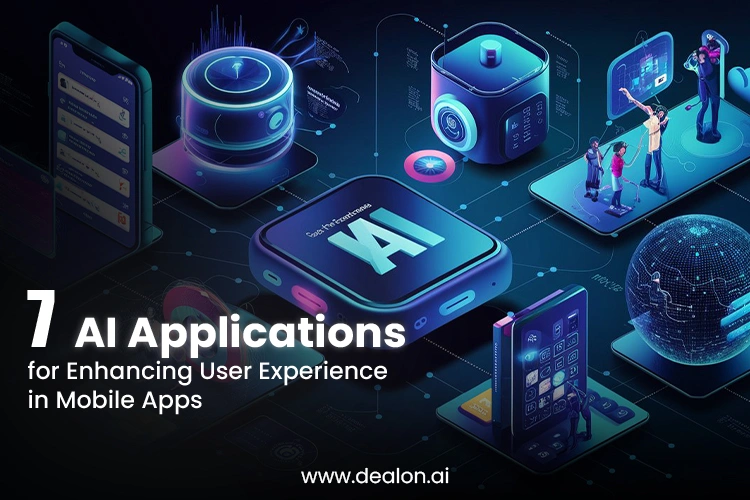With the digital landscape evolving, mobile apps have become essential to daily interactions, making user experience (UX) more vital than ever. With the advent of AI, developers are now equipped with advanced tools to refine and elevate mobile app interfaces, fostering deeper connections between users and the technologies they engage with. AI’s ability to analyze extensive amounts of information, recognize patterns, and make intelligent predictions empowers developers to craft intuitive and profoundly personalized applications.
By incorporating AI, mobile apps are no longer just functional—they evolve into dynamic platforms that adapt to user behavior, anticipate needs, and streamline interactions. From intelligent chatbots offering real-time support to augmented reality (AR) features enhancing product visualization, AI is revolutionizing how users experience mobile applications. As AI advances, its integration into mobile apps ensures that these platforms become increasingly responsive, intuitive, and seamless. This blog delves into seven innovative AI applications redefining user experience, highlighting how these cutting-edge technologies set new standards for mobile app design, functionality, and user satisfaction. With AI at the core, the future of mobile apps is poised for unprecedented growth and innovation.
Also Read: The Intersection of AI, Chatbots, and Sustainability in Marketing
Personalized Recommendations: Tailoring Content for Users

Personalized recommendations are one of the most potent ways AI transforms user experience within mobile apps. Leveraging sophisticated algorithms, AI-driven recommendation systems delve into users’ past behaviors, preferences, and interactions to curate highly relevant content that feels intuitively aligned with their needs. In an e-commerce app, this could manifest as customized product suggestions; in a streaming service, it could translate into personalized movie and show recommendations. Drawing on data patterns, these AI systems create a seamless, individualized experience that feels organic, enhancing user satisfaction and engagement.
These systems’ core are machine learning techniques such as collaborative filtering and deep learning. Collaborative filtering looks at the collective behavior of users with similar tastes. At the same time, deep learning algorithms evaluate intricate relationships within vast datasets, ensuring that recommendations are relevant and continually evolving. As a result, AI systems improve over time, refining their suggestions to suit user preferences better. This adaptability fosters a sense of personalization and connection, ensuring users feel understood and valued.
By incorporating AI-driven features, mobile apps create an interactive environment where users stay engaged, explore personalized content, and discover products or services that match their preferences, enhancing their overall experience.
Voice Assistants and Conversational AI
Voice assistants and conversational AI have become indispensable tools in enhancing mobile app user experience, providing a fresh perspective on engagement that is both user-friendly and effective. By integrating natural language processing (NLP), apps can accurately understand and interpret user commands, allowing users to engage in hands-free, real-time conversations. This technology not only elevates accessibility but also streamlines daily tasks, transforming complex interactions into simple voice commands. Whether setting reminders, sending messages, or providing weather updates, voice assistants make these functions effortless.
Conversational AI elevates this concept by facilitating more profound, context-aware interactions. These intelligent systems can engage in multi-turn dialogues, remembering previous exchanges and offering tailored responses. For instance, a conversational AI-powered app can book a flight, adjust travel details, or answer user queries with remarkable fluency. The technology continuously learns from interactions, becoming more adept at predicting user preferences and anticipating needs over time.
By incorporating such capabilities, mobile apps enhance user experience by reducing manual input, increasing convenience, and providing personalized assistance. The seamless communication fostered by voice assistants and conversational AI creates a more engaging and efficient app experience, ensuring users can navigate and complete tasks effortlessly without traditional interface navigation.
AI-Powered Chatbots for Instant Support

AI-powered chatbots have revolutionized customer support in mobile apps by providing instant, around-the-clock assistance that significantly enhances user experience. These intelligent bots can address many user inquiries, ranging from FAQs to more intricate troubleshooting scenarios. By handling these tasks autonomously, chatbots free up human agents for more complicated issues, ensuring that users receive timely and efficient support at all hours.
One of the key edges in chatbot technology is the integration of sentiment analysis. This feature enables chatbots to detect and respond to the emotional tone of user interactions, allowing them to tailor their responses with empathy. For instance, when a user conveys frustration, the chatbot can modify its tone to provide a calmer and more comforting reply. This emotional intelligence ensures that the support experience feels more personalized and human-like, strengthening the relationship between the app and its users.
Furthermore, AI-powered chatbots continuously evolve through adaptive learning, improving their understanding of user preferences and behaviors. Over time, they become more proficient at anticipating user needs and offering solutions before a query is raised. This proactive support enhances user experience, making interactions smoother, more efficient, and ultimately more satisfying.
Augmented Reality (AR) with AI for Immersive Experiences
The fusion of AI and AR is transforming the user experience in mobile apps, creating unprecedented opportunities for immersive and interactive environments. This robust combination allows users to engage with their surroundings dynamically, blending the virtual and physical worlds. One notable example is IKEA Place, an app that leverages AI-driven AR to show users how furniture will appear in their homes before purchasing. By simply pointing their mobile device at a space, users can see scaled 3D models of products integrated into their actual environment, enhancing decision-making and reducing the risk of post-purchase regret.
AI enhances AR experiences by interpreting the environment in real time and adjusting virtual objects to fit seamlessly into the user’s surroundings. This involves sophisticated algorithms that assess lighting, surface textures, and spatial dimensions, ensuring that virtual objects appear realistic and interact fluidly with the physical world. As a result, the user experience becomes more intuitive and lifelike, allowing for more informed choices and reducing the cognitive load traditionally associated with product selection.
Moreover, AI-driven AR extends beyond retail with gaming, education, and healthcare applications. In gaming, for example, AR-powered games integrate virtual characters and objects into real-world locations, creating rich, interactive environments that blur the line between imagination and reality. In education, augmented reality enhances learning by offering immersive experiences, allowing students to engage with 3D models of intricate concepts such as human anatomy or historical artifacts.
AI and AR deliver an engaging and practical user experience by bridging the gap between digital and physical realms. This innovative approach holds the prospect of transforming how users engage with apps, transforming routine interactions into exciting and transformative experiences.
Predictive Analytics: Anticipating User Needs

Powered by AI, predictive analytics revolutionizes how mobile apps anticipate and respond to user behavior. By analyzing extensive historical data, predictive models can forecast user actions, preferences, and needs, allowing apps to offer highly personalized and proactive experiences. This technology elevates user engagement and creates a more intuitive relationship between the app and its users, enhancing overall user experience.
For instance, fitness apps utilize predictive analytics to anticipate a user’s preferred workout times and suggest customized exercise routines tailored to their goals. By analyzing patterns in workout history, sleep cycles, and even weather forecasts, the app can recommend the most optimal training schedule and suggest activities that align with the user’s fitness objectives. This level of foresight simplifies user decision-making, reducing friction and encouraging more consistent engagement.
Predictive analytics can also improve app performance by streamlining interactions. In e-commerce apps, for example, predictive algorithms can suggest products based on browsing history and seasonal trends, creating a highly personalized shopping experience. This predictive capability enhances satisfaction and fosters customer loyalty by making users feel comprehended and valued.
Moreover, by anticipating user needs before they are explicitly stated, predictive analytics allows apps to provide a more seamless, proactive service. For example, customer service apps can preemptively offer assistance for common issues or provide personalized support options before a user can initiate a query. In this way, predictive analytics plays a critical role in cultivating a user experience that is reactive and anticipatory, making the app feel more responsive and aligned with the user’s needs.
AI-Driven Security Features for User Confidence
In today’s digital era, user experience is heavily influenced by the level of security an app can provide, mainly when it handles sensitive data like banking information or health records. AI-driven security features have become indispensable in building user trust and enhancing safety and overall experience. By integrating advanced technologies such as biometric authentication, anomaly detection, and fraud prevention, AI ensures that users feel confident when interacting with apps, knowing their personal and financial information is safeguarded.
Biometric authentication, powered by AI, is one of the most significant advancements in mobile app security. Facial recognition, fingerprint scanning, and even behavioral biometrics offer seamless and highly secure methods of user verification. These AI technologies continuously evolve to recognize subtle changes in user behavior, such as typing speed or navigation patterns, making unauthorized access virtually impossible. Integrating these biometrics ensures that only the rightful user can access the app, significantly improving the user experience by eliminating the demand for cumbersome passwords or PIN codes.
AI also excels at anomaly detection, a crucial feature for apps that deal with financial transactions or personal health data. Machine learning algorithms monitor user behavior in real time, detecting anomalies like unusual spending habits or unauthorized access attempts. When anomalies are detected, AI can trigger alerts or take immediate actions to prevent potential fraud, offering users peace of mind.
Additionally, fraud prevention mechanisms, fueled by AI, can identify and block fraudulent activities before they affect the user. These proactive measures build long-term trust between the user and the app, Ensuring a user experience where security is not an add-on but a core principle. By offering this advanced protection layer, AI helps establish a safe, reliable environment that fosters user loyalty and confidence.
Dynamic Content Adaptation for Accessibility
AI-driven dynamic content adaptation revolutionizes user experience by offering personalized and accessible interactions within mobile apps. This technology allows apps to seamlessly adjust their content based on a user’s preferences, device specifications, and even real-time environmental factors. Such adaptability ensures that apps remain inclusive, catering to diverse users with changing demands and preferences.
One key example of dynamic content adaptation is in reading apps, where AI tailors the content to suit the user’s visual and cognitive requirements. For individuals with visual impairments, AI can automatically adjust font sizes, contrast levels, and color schemes to enhance readability. This is especially valuable for users with dyslexia or low vision, as it ensures they can comfortably engage with the content without encountering barriers. Additionally, AI-powered language settings can instantly translate or localize text, accommodating users of different languages or regions with specific dialects.
Beyond accessibility, AI adapts content based on device specifications, ensuring optimal performance across screen sizes, resolutions, and hardware capabilities. For example, AI can intelligently condense or simplify content on a smaller screen, offering a streamlined interface while maintaining functionality and clarity. Similarly, when the app detects a low-battery situation, it can reduce the demand on device resources, enhancing performance and preventing disruptions.
By embracing dynamic content adaptation, mobile apps create an inclusive and user-centric user experience. This flexibility ensures the app remains enjoyable and functional for a broader audience, including those with disabilities, different languages, or varying technical environments. Ultimately, it fosters a sense of empowerment and inclusivity, enhancing overall satisfaction and engagement.
Conclusion
AI is rapidly transforming the user experience in mobile apps, introducing innovative technologies that enhance personalization, accessibility, and security. From AI-powered recommendation systems that tailor content to individual preferences to predictive analytics that anticipate user needs, these advancements create more intuitive, engaging, and proactive interactions. Voice assistants and AI-driven chatbots further enrich the experience by offering real-time assistance, while AI and augmented reality combine to deliver immersive, practical applications that redefine user engagement.
Moreover, AI’s role in enhancing security—through biometric authentication, anomaly detection, and fraud prevention—fosters trust and confidence, ensuring users feel safe using apps that handle sensitive data. Dynamic content adaptation, powered by AI, guarantees that mobile apps are acquireable for everyone, regardless of their specific needs or device capabilities, making the user experience more inclusive and seamless.
As these AI applications evolve, they promise to elevate user experience to new heights, making mobile apps brighter, more responsive, and more user-friendly. By leveraging AI’s capabilities, developers can create personalized, secure, and inclusive environments that meet and exceed user expectations, fostering long-term loyalty and satisfaction. The future of mobile app design is undeniably intertwined with AI, and its potential is limitless.

